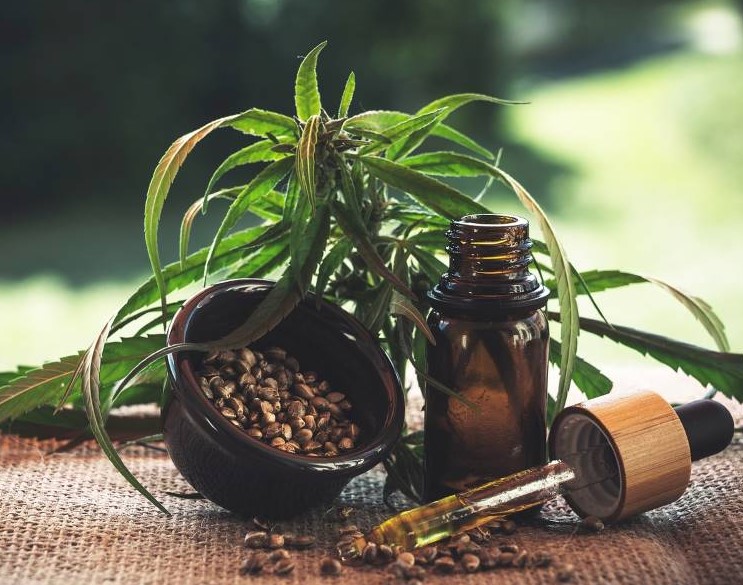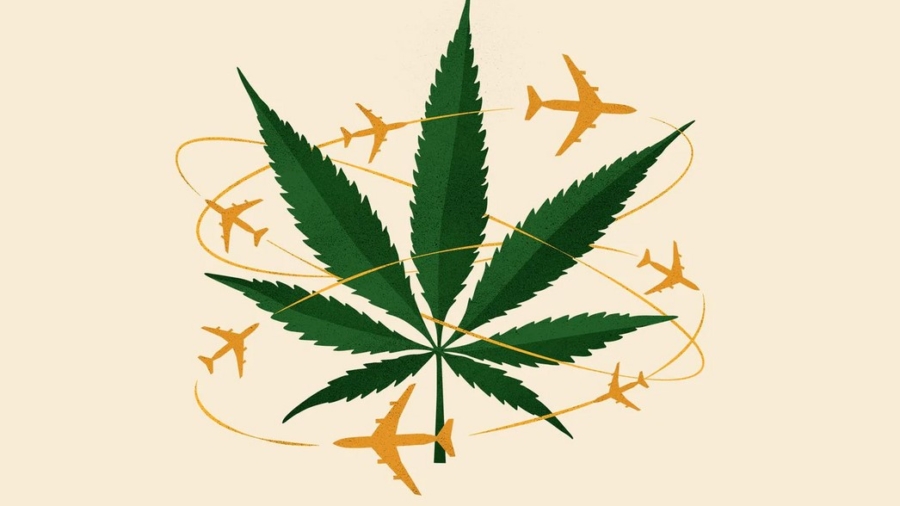CBD is enjoyed by people all around the world. However, in some areas, CBD is still a banned or controlled substance. And, even if CBD is legal in your country, you may face challenges if you try to fly out of the country with your CBD.
Recently, it became legal to fly with CBD oil in the US. However, in other countries, that may not be the case. CBD, also known as cannabidiol, is a compound found in varieties of the cannabis plant, both hemp, and marijuana; although CBD that’s legal in the United States contains less than 0.3% THC concentrations, which means it won’t cause a psychoactive reaction, many countries still consider this compound a controlled substance.

Still, many CBD lovers want to fly with their products because of their potential to ease symptoms of anxiety, among other problems. Some people who get anxious while on a plane may wish to take a dose while flying, hoping to minimize their distress. But before slipping your CBD into a carry-on bag, or even in your checked luggage, it’s crucial to read up on all the regulations. That’s the best and easiest way to stay on the right side of the law when flying with CBD. So, can you bring CBD oil on a plane? Let’s take a deeper look at the factors to consider before flying with CBD oil.
You can get CBD oil in your coffee, buy CBD oil bath bombs, CBD oil lotions, and even CBD oil dog treats. It’s a buzz-worthy topic in the health and wellness space, but many travelers are left confused about its legality, especially when they’re considering taking certain products on a plane or traveling internationally.
First off, let’s define what CBD oil actually is. According to Merriam-Webster, CBD is “a nonintoxicating cannabinoid found in cannabis and hemp,” and that CBD oils contain cannabidiol. The types of oils that we’re referring to are oils derived from the hemp plant (not marijuana) and contain only a minimal amount (less than 0.3 percent) of tetrahydrocannabinol, or THC, which is the intoxicating or psychoactive compound of the plant that makes users feel “high.” It’s common knowledge that this minimal amount of THC does not produce noticeably intoxicating side effects.
Thanks to some recent legal changes around CBD at the federal level, it’s becoming a bit more straightforward. Here’s what I learned about traveling with CBD oil after speaking with Sherri Tutkus, BSN-RN and founder/CEO of the GreenNurse Group, and Joshua Bauchner, a lawyer for the Canafarma Corporation.
What Happens if You Want to Travel With CBD Oil to Other Countries?
Since the international rules and regulations on CBD are unclear and vary by region, the best thing to do is to research CBD laws of CBD in your destination country (as well as the laws in any planned stopovers). Even if CBD is legal in the country where you’re heading, however, most professionals advise against carrying CBD infused products on a plane, especially if the country you are traveling to has stricter drug laws. You don’t want to get into trouble in a new country, so it may be simpler to ship your CBD oil to your final destination than to risk confusion and complications at the airport.
Things to Look for When Buying CBD Oil for Travel
When you are purchasing CBD oil for travel, you need to be cautious. Remember, you have to purchase an approved product that meets all federal guidelines. When choosing the CBD, one good strategy to use is the FLOW acronym, which helps you choose CBD oil that is of high quality. First, check whether the CBD oil has flowering strains of hemp or cannabis. Next, confirm whether the product has undergone lab testing for potency and purity. Also, confirm that the product is organic. If your product has met all the above requirements, it is considered safe for use. Another good rule of thumb when buying CBD? Examine the CBD extraction process that was used to derive the oil. While there are various modes of extraction, if possible, choose a CBD oil derived using CO2 extraction, since this method produces the safest and most pure CBD oil.
Alternatives to Bringing CBD Oil on Plane
If you are still concerned about flying with your CBD oil products, here are some lower-risk alternatives for you: First, you can take a CBD capsule, tincture, or any other edible before your flight. This is a great option because you won’t have to go through the airport checkpoints with your product, but you will still enjoy the desired effects for most if not all of your travel experience. It could also be fun to discover a new CBD supplier in your point of destination. Or, as we suggested earlier, purchase your cannabidiol from an online CBD store, and have your product shipped to your ultimate destination.
Traveling with CBD Oil Domestically
The type of CBD oil that’s derived from hemp oil is what’s legal at a federal level (as of the 2018 Farm Bill) and therefore allowed to be taken across state borders, and, yes, on flights. Other CBD oils, like the type that’s derived from marijuana, are still illegal in some states—so it’s not recommended to take those types across state borders.
You can tell the difference between the two types of CBD oil by reading the product’s label and identifying the amount of THC in it. Only hemp-derived CBD oils (with THC levels below 0.3 percent) are legal to fly with or be taken across state borders in the U.S. It’s also important to note that while CBD oil is legal at the federal level, certain state laws vary in terms of possession of any type of CBD oil.
Here’s the status of flying with CBD oil in the U.S. as of January 2020, according to the TSA’s website:
“Marijuana and certain cannabis-infused products, including some cannabidiol (CBD) oil, remain illegal under federal law except for products that contain no more than 0.3 percent THC on a dry weight basis or that are approved by FDA. (See the Agriculture Improvement Act of 2018, Pub. L. 115-334.) TSA officers are required to report any suspected violations of law to local, state or federal authorities.
“TSA’s screening procedures are focused on security and are designed to detect potential threats to aviation and passengers. Accordingly, TSA security officers do not search for marijuana or other illegal drugs, but if any illegal substance is discovered during security screening, TSA will refer the matter to a law enforcement officer.”
As an extra cautionary step, double-check the CBD oil possession laws of both the state you’re traveling to and the state you’re traveling from. The website CBD Origin recommends printing out a product’s lab report and have it available if needed to verify the cannabinoid content to any inquiring authorities. And if you’re traveling with CBD oil products as medication, you should always travel with your prescription handy, as you would any other prescribed medicine.
Traveling with CBD Oil Outside of the U.S.
International rules and regulations on CBD are less clear, so if you’re looking to travel abroad with CBD oil you’ll need to research the laws of the country you’re traveling to. However, professionals strongly advise to err on the side of caution and leave products with any cannabinoids (including hemp-derived oils) at home, especially because some countries have much stricter drug laws.
Related:
Your 11 Most Frequently Asked Travel Questions, Answered
Cruising regulations for CBD oil are confusing. Some cruise lines ban CBD oil altogether, so it’s best to contact the cruise line directly if you need to travel with CBD oil on your cruise. Remember, there are security scanners as you board a cruise ship, so there’s no hiding CBD products.
The Benefits of CBD Oil for Travelers
CBD oil has many uses. It can help travelers regulate their body’s organs, immune system, and neurotransmitter signaling systems, which can help alleviate symptoms of jet lag, anxiousness, and sleeplessness.
For travelers specifically, Tutkus recommends CBD oil “for long flights to decrease stiffness and soreness, to help regulate sleep patterns with time change and jet lag, and to help decrease anxiety related to the unknowns of traveling.” She says “some people have even replaced their prescription [bensodiazepines] with CBD oil, instead of having to take a Xanax or Ativan prior to a flight.”
If you’re nervous about flying with any of these products in your possession, then take it ahead of your flight and find a legal place to buy it on the ground.
What to Look for When Purchasing CBD Oil for Travel
If you’re looking to purchase CBD oil for travel, use the acronym ‘FLOW’ which is a way to choose a product that is up to cannabis-nurse-approved standards:
F: Flowering Strains of Hemp or Cannabis
L: Lab tested for purity and potency, COA
O: Organic
W: Whole Plant
According to Tutkus, you should also ask the following questions:
- Is it made from industrial hemp or flowering strains of hemp?
- What is the extraction process?
- What is the carrier oil?
- Is it whole plant?
- Is it tested for purity and potency?
- Is there a certificate of analysis that reflects what the label says?
Again, only hemp-derived CBD oils (with THC levels below 0.3 percent) are legal to fly with or be taken across state borders in the U.S.
Additionally, the FDA has separate regulations on CBD oil labeling, including that it cannot be marketed as a dietary supplement—that information can be found here.
Tips for Traveling with CBD Oil
There are a variety of different types of ways to consume CBD oil including topical creams, edibles (which have been questioned in terms of effectiveness), and vaping devices. Here’s the lowdown on traveling with each.
For all edibles, gels, lotions, oils, and other liquids, you should follow and comply with normal TSA 3-1-1 rules when you’re traveling with CBD oil. You don’t need to declare them separately, but you shouldn’t hide them, either. While the TSA’s statements make it seem like they are not looking for cannabis products, you’re still subject to search, which could lead to delays at the airport.
Related:
How to Travel Without Liquids or Gels
According to the TSA, you may bring electronic devices and vaping devices (including batteries and atomizers) stored in your carry-on bags, but not checked bags.
The only type of CBD oil product that Tutkus doesn’t recommend traveling with in the U.S. is hemp flower, because of its similarities to the cannabis flower. Lab results are the only way to tell the difference between the two plants.
The Best Types of CBD Oil to Travel With
Tutkus’ go-to products for travel are Irie Bliss Goddess Oil, Apothecary Care Full Spectrum CBD tincture, Apothecary Care Full Spectrum Daytime Gummies, Apothecary Care Full Spectrum Nighttime Capsules, and SOS lotion (note that this product is 4 oz).
Irie Bliss also makes a CBD Pain Balm stick (similar to a deodorant stick) that can be applied as a roll-on for quick application. And Jules Battel NP-BC for the GreenNurse Group says she’s, “a big fan of the tiny sublingual oral spray”.
Bauchner recommends other alternatives like Yooforic’s Hemp-Oil Infused Chewing Gum, and Organic Hemp Oil Tincture as they don’t require a vaporizer to consume.

There are laws about the amount of liquid you are able to have in containers. The CBD oil I sell is TOTALLY LEGAL in all 50 States. It is legal because it is lower in CBD content. Perfectly legal. I would carry a brochure about the product with you. Only to prove what you have is totally legal. I am not sure about taking it to another country, but our team ships to many different countries. I hope your question has been answered. You have received tons of responses.